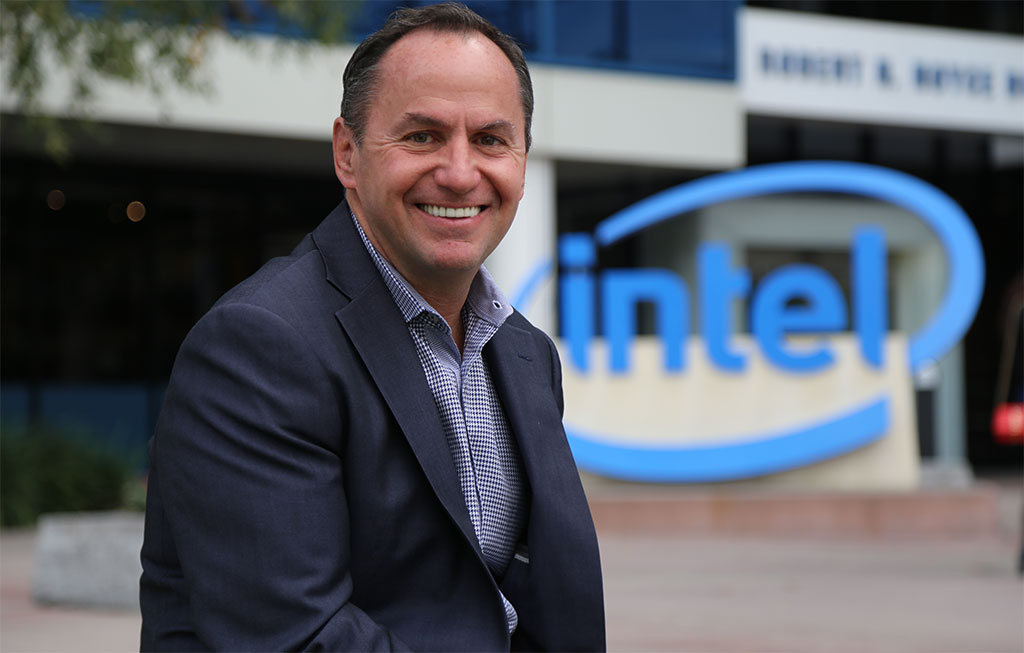After more than half a year, Intel has chosen a CEO
This is Intel's seventh CEO in 50 years.

Intel on Thursday announced that Robert Swan will fill the position of chief executive officer after serving as interim CEO for the past seven months. Swan is now officially Intel's seventh CEO in 50 years, and he steps into the role as Intel simultaneously navigates to a volume 10-nanometer product roll out, and prepares for 7nm.
Swan is somewhat of a surprise pick, given Intel's history of hiring CEOs who had risen in rank at the company. According to Reuters, this is the first time Intel has picked a leader who didn't start out much lower—Intel has typically been led by engineers who have worked at the company for decades.
"As Intel continues to transform its business to capture more of a large and expanding opportunity that includes the data center, artificial intelligence and autonomous driving, while continuing to get value from the PC business, the board concluded after a thorough search that Bob is the right leader to drive Intel into its next era of growth," said Chairman Andy Bryant. "The search committee conducted a comprehensive evaluation of a wide range of internal and external candidates to identify the right leader at this critical juncture in Intel’s evolution."
Technically, Swan is an internal candidate. He had been serving as interim CEO since Brian Krzanich abruptly resigned seven months ago, and before that, he was Intel's CFO since just 2016. It's a relatively short tenure, though—Swan spent nine years at Ebay as CFO, and briefly worked at a private equity firm before joining Intel.
Bryant said Intel's board "considered many outstanding executives" before ultimately deciding on Swan. Intel's financial performance during the past seven months played a role in that decision.
"In my role as interim CEO, I’ve developed an even deeper understanding of Intel’s opportunities and challenges, our people and our customers," Swan said. "When I was first named interim CEO, I was immediately focused on running the company and working with our customers. When the board approached me to take on the role permanently, I jumped at the chance to lead this special company."
Having a permanent CEO gives Intel some added stability, and perhaps more importantly, it allows the company to focus its efforts squarely on future product releases. In addition to 10nm and 7nm products on the horizon, Intel is also getting into discrete graphics, with plans to launch its first modern discrete GPU in 2020.
The biggest gaming news, reviews and hardware deals
Keep up to date with the most important stories and the best deals, as picked by the PC Gamer team.
Intel is also facing increased competition from AMD, which has reasserted itself into the enthusiast conversation with its Zen CPU architecture. AMD has a head start to 7nm as well, both with GPUs (Radeon VII) and CPUs (Zen 2).
While the pick is surprising to some—Intel's share price is down a few percentage points, and AMD's is up—tech analyst Patrick Moorhead at Moor Insights and Strategy thinks Intel ultimately made the right decision.
"I am a bit surprised as Swan said he didn’t want the role, but I always thought that he should be considered for it. Swan told me that as he was in the interim CEO role, he started to like and enjoy it," Moorhead said. "I do think Intel’s strategy is the right one; the company needs to improve its execution, and bringing in an outsider without Intel experience didn’t make sense. Intel has a very strong bench, two who were considered for the CEO role, who will help Swan and Intel."
This will be a telling year for Intel and its newest CEO. The first challenge will be to get 10nm out the door in volume. Barring any more delays, that will happen at the end of the year.
Paul has been playing PC games and raking his knuckles on computer hardware since the Commodore 64. He does not have any tattoos, but thinks it would be cool to get one that reads LOAD"*",8,1. In his off time, he rides motorcycles and wrestles alligators (only one of those is true).


